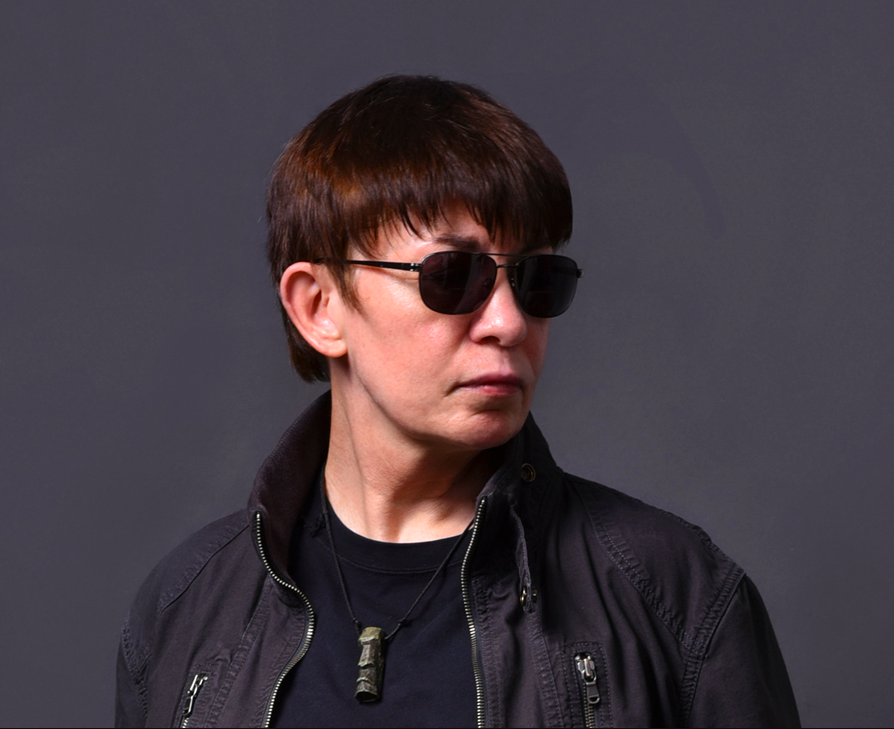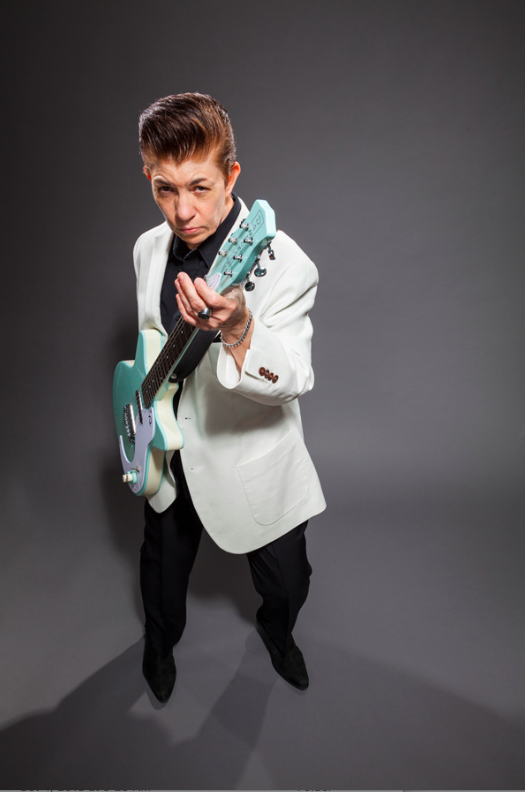Once you reach a certain age, you realize that life is rarely a straight drive from Point A to Point B. Usually, either by choice or happenstance, life has a tendency to take the scenic route from Point A to Point B. The story of Susan SurfTone is no different. From a very young age, she wanted to be a musician.
“I was an Elvis Presley fan early on,” SurfTone says. “Though my mom was from the big band era, she liked rock and roll. She would listen to it on the radio. She took me to see the Elvis Presley film, ‘Jailhouse Rock,’ when I was three. I became an Elvis fan and wanted to be Elvis. I actually got to be Elvis on my latest album, which was an Elvis tribute. When the Beatles came over in 1964 and were on Ed Sullivan, I knew I had to do it. I didn’t tell anybody at the time, but I knew that’s what I kind of wanted to do with my life. I got a guitar and I begged my parents for guitar lessons.”
Elvis and the Beatles are two of the biggest musical acts of all time. Their influence on musicians of that era through today is probably indescribable. But what about aspiring female rockers of the 60s? Granted, rock and roll was still fairly new then, but up until that time, female-fronted groups consisted of “girl groups” like the Shirelles, the Dixie Cups and Martha Reeves and the Vandellas. With her appearance at the 1967 Monterey Pop Festival, Janis Joplin became a certified star and changed the narrative for a generation of aspiring female singers, SurfTone included.
“I liked her music though it was more blues based,” SurfTone says. “I was in my early teens when I first saw her. What struck me about her is that was the first time I saw a woman fronting a band; someone who wasn’t just a background singer in heels with a bouffant hairdo. She was a woman who was really fronting the band. At the time, I didn’t know the bio of her life and didn’t know the struggles she went through, but she was the first one to show me that it could be done.”
Instead of taking the typical aspiring musician journey of waiting tables until you get discovered, SurfTone (aka Susan Yasinski) navigated a very unusual route in that she ended up graduating from Boston University’s law school.

“I didn’t want to work for a law firm. That didn’t seem to exciting to me. My parents had taken me to the J. Edgar Hoover building as a kid. I went on the tour, and it seemed like something exciting I would want to do. I wanted to learn to shoot. I liked the physical challenge of the whole job too. When I was looking for a job after law school, I took the tests for both the FBI and the CIA. I got through the first level for both of them and decided to go on to the Bureau.”
While her mother might have planted the seed for SurfTone’s musical aspirations, her father helped prepare her for the rigors of the FBI Academy.
“We had to go through three months of pretty intensive training,” SurfTone says. “We had to learn self-defense. You had to be in good physical condition. We would box with each other. We had to learn to fight to take care of ourselves on the street. I came from a sports family. I’m the only child of a professional baseball player. My father had pitched for the Brooklyn Dodgers in the minor league in the late 40s and 50s. I had learned a lot about sports and he had taught me to box so I wasn’t afraid of it. It was also challenging academically though I graduated high in my class, but I really wanted to do the work. I wanted to do foreign counter-intelligence work. In college, I had studied international politics and economics with kind of an emphasis on the Soviet Union.”
With her knowledge of the Soviet Union, she was soon tasked with monitoring KGB operatives assigned to the U.N. At this time, the Cold War had escalated. During Ronald Reagan’s first term as president, he called the Soviet Union, “the evil empire,” while stockpiling weapons and multiplying the number of U.S. troops. Though, for obvious reasons, she can’t go into detail, SurfTone was on the front line of the Cold War.
“Back in the early 80s, the Soviet Union was trying to do a push to get in Reagan’s way after he had just been elected. There were some operations that we worked on that I think were pretty effective in preventing that from happening.”
The more things change, the more they stay the same. While some names might have changed, the U.S. might be still fighting the Cold War – with Russia instead of the Soviet Union.
“It’s too close to what’s happening today,” SurfTone says. “It’s amazing that even though it’s been over 30 years, not much of the actual spy craft involved has changed. A lot of the things that we were doing back then are very similar to what’s going on today; how approaches are made; the long game that the Soviet Union and now Russia plays; how they cultivate people. None of that has changed. It hasn’t changed but it’s all based on human nature so I guess it won’t change.”
And just like with any journey, you will eventually find yourself at a fork in the road. SurfTone felt it was time to leave the Bureau.

“I had quit for the bureau for two reasons. I wanted to start a rock-n-roll band and play in clubs like CBGB. The bureau didn’t want me to do that, so I was kind of at a crossroads. I was 28 years old, and it was either never play music and stay with the Bureau or do what I really wanted to do, which was play music. Also, when I was in the Bureau, being gay was an automatic ticket to being fired. We weren’t able to have top security clearance if we were considered a security risk. There were several gay agents, but if you were found out, you’d lose your job. I was tired of being concerned about that, and I wanted to live more openly as a lesbian.”
She soon found herself as an attorney for the NYPD assigned to the Tactical Narcotics Team in Harlem.
“I learned landlord/tenant law when I worked for a landlord up in Harlem. When I went to the NYPD, I worked as an attorney. One of my jobs was evicting drug dealers from housing projects. It was a combination of my law enforcement experience and my legal training.”
While the FBI might have been a “straight boys (and girls) club,” the NYPD was more progressive.
“I was able to be openly gay at the NYPD,” SurfTone says. “I can honestly say I didn’t get any blowback at the NYPD. Nobody bothered me, and I was able to play in a rock band so that made me happy.”
Over the years, many crime procedurals on TV have portrayed the NYPD as a “straight boys (and girls) club. While that may be true, SurfTone didn’t see it firsthand.
“I was an attorney, so I worked at One Police Plaza. I didn’t deal much with police officers except when we needed them to testify or to brief them before a raid. I don’t know if that’s the same for everybody, but from my experience, I didn’t get any blowback. My experience was good with the NYPD.”
With the proliferation of social media and the 24-hour news cycle, the marriage of law enforcement and the media is indisputable. There was a time when this wasn’t true, however. As with her time with the FBI, SurfTone can’t go into much detail about her time with the NYPD, but she was able to relate the first time she saw law enforcement use the media.
“There was a big drug bust up in Harlem,” she recalls. “The commissioner at the time, Benjamin Ward, was actually at the raid. They did a whole PR thing, and it was interesting using the raid as a PR opportunity. Plus, I got to ride with a canine, so that was a lot of fun.”
Now, not only was SurfTone able to realize her dream of performing at the legendary night club, CBGB, she was being paid to do what she loved.
“I don’t remember my actual first paying gig. I’m sure it was at a small club where you get a share of the tickets sold at the door so it probably wasn’t much. The best paying gig I had was when two of my songs were used on ‘The Real World: Sydney’.”
SurfTone soon found herself at another fork in the road and decided to take a leap of faith.
“In 2001, I moved to Portland actually. I wanted to try the West Coast. I had never been there. I was in Portland for quite a while, and I would make trips to L.A. I really liked L.A., so in January of this year I made the leap and rented an apartment in L.A.”
While many people in New York don’t have cars, L.A. has a reputation of being very car-centric. SurfTone doesn’t buy into this.
“I like New York because you can walk around,” SurfTone says. “When I moved to L.A., I picked a place in Studio City where I can actually walk around to every place I need to go. I can get around on the Red Line, and when I need to, I use Lyft. I am absolutely determined you can live in L.A. without a car.”
With songs like “Wipe Out” by the Surfaris and groups like, of course, the Beach Boys, surfer music is as ingrained in Southern California culture as earthquakes, traffic and In ‘N Out. SurfTone decided to make her mark in another traditional “straight boys club.”
“I started Susan and the SurfTones, playing surf music of course, since California is the home of surf music. I like the Ventures a lot. Even though he’s really not considered surf, he’s very influential in surf. That would be Link Gray. He’s considered to be the father of the power chord. You hear his influences in modern surf music a lot. I like the Surf Raiders. There’s a band called Jon and the Nightriders that were around in the 70s. John Blair is still playing and he’s very good.”
SurfTone has been successful in taking the scenic route from her Point A and Point B. She has advice for anyone who wants to change the destination on their journey.
“Think about it and plan it out. Be willing to take calculated risks. I had to think about, ‘if I didn’t do it, would I regret it when I got too old to do it?’ That’s what my motivation was. ‘Are you going to look back wish you had tried it?’”
